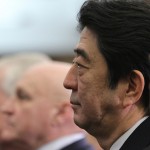
Japanese leader Shinzo Abe isn’t known for his adroit handling of history. Rather, he is routinely lambasted for remembering Japan’s wartime past in a way that offends former victims, and (as I have written) derails his own strategic agenda. But in Canberra, at his speech to the Australian parliament, he got one right, as I argue in my article in The National Interest. Abe crafted a reconciliatory narrative that demonstrated empathy and respect for an important partner. The speech was a brilliant move that helps lay the groundwork for closer cooperation with Australia — at a time when both countries are concerned about China’s rise.
Australian leader Tony Abbott clearly has read the reconciliation playbook as well. In his own speech, he talked about Japanese soldiers’ courage in the raid on Sydney harbor in 1942. “We admired the skill and the sense of honour that they brought to their task although we disagreed with what they did,” Abbott said. “Perhaps we grasped, even then, that with a change of heart the fiercest of opponents could be the best of friends.” Abbott’s generous statement earned some criticism at home–reflecting the kind of backlash that reconciliatory narratives provoke.
Abbott’s statement evokes the magnanimity of French leaders who remembered history in ways to facilitate Franco-German reconciliation. Abbott sounded like Francois Mitterrand on the fiftieth anniversary of Germany’s World War II surrender on May 8, 1995, when the French leader honored German soldiers: “They were brave, they were willing to lose their life,” he commented. “For a bad cause, but to them their gesture had nothing to do with it.” Similarly, Nicolas Sarkozy, on Armistice Day, 2009 said the French and Germans gathered together to mourn shared suffering. “German orphans wept for their slain fathers in the same way as French orphans,” he said. “German mothers felt the same pain as French mothers as they stood before the coffins of their fallen sons.” Such acknowledgment of the other side’s suffering and of its heroes is a vital part of harmonizing historical narratives–which, as scholars Charles Kupchan and Yinan He have argued, is a vital aspect of reconciliation.
This reconciliatory narrative stands in sharp contrast to the narrative crafted by the Park government in South Korea. This narrative celebrates the assassination of a leading Japanese political figure; it demonstrates no empathy toward ordinary Japanese people and their wartime suffering.
To be sure, the South Koreans are justified in their anger about how Japanese elites (and Abe specifically) have obfuscated, and sometimes even denied, past atrocities. (See smart pieces by Robert Kelly and Tessa Morris-Suzuki here and here.) Koreans have every right to remind Tokyo of the terror it inflicted on them, and to demand apologies for as long as they want.
But so do the Australians, and so did the French–yet their governments chose a different path. The divisiveness of the Japan-ROK narrative — emanating from both governments –reflects two countries that are much less committed to a strategic partnership, which are currently content with their distant relations.